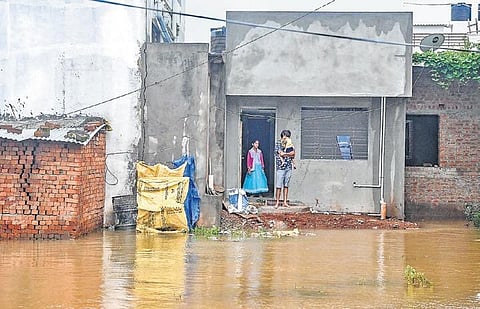

BENGALURU: With torrential downpour and landslides being reported amid the pandemic across many districts in Karnataka, epidemiologists and public health experts fear rise in Covid-19 cases. They urge officials to take extra precautions and not to ignore the danger of an outbreak of other communicable and vector-borne diseases.
“Floods result in extreme hardships, often resulting in congregations of the displaced population. In addition to the risk of other communicable diseases, there is a higher risk of transfer of Covid-19 infection in closed spaces with many people in close contact. Although difficult, it is important to ensure humanitarian aid also includes the provision of masks,” said Dr Giridhara R Babu, senior epidemiologist and advisor to Covid-19 technical committee in the State.
According to public health experts, the virus complicates preparedness efforts amid concerns it could spread within crowded shelter homes with zero social distancing. “Floods can give rise to many public health issues. Overflowing drains and sewage water can lead to increased incidence of water-borne diseases like Hepatitis A, typhoid, leptospirosis and cholera. Vector-borne diseases like malaria, dengue and chikungunya can go up. Children and the elderly are more vulnerable,” Dr Sylvia Karpagam, public health activist, said.
“The Covid pandemic as well as flooding require good public health systems, preventive measures and health education. In the absence of these, communities are very vulnerable to adverse consequences of both and face dual risk,” Sylvia said. Meanwhile, experts fear that testing in these regions might come down drastically as the attention of the district in-charge officers would now shift to handling flood situations. They warn that the relief measures need to happen with the pandemic in mind.
“It is a very difficult time. Tests should continue in these districts too amid the flood-like situation. If the number of tests reduce, then there might be a sudden spike in mortality rates,” said a senior epidemiologist. Experts say officials should impose new rules to protect people now. They should screen people before they are allowed inside shelter homes, separate them if they are symptomatic, do antigen tests, ensure social distancing and limit each space to fewer than 30-50 people.